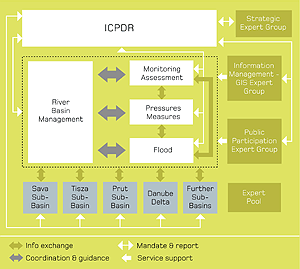 |
Adapting to changing circumstancesWith streamlined work groups and a reorganised structure designed for performance, the ICPDR is ready to meet the challenges of EU water legislature. |
 |
The team at the Secretariat, supporting the ICPDR: Philip Weller, Executive Secretary; Anna Koch, Financial Officer; Alex Höbart, Information Management & GIS; Jasmine Bachmann, Public Participation & Public Relations; Sylvia Kersch, Management Assistant; Birgit Vogel, River Basin Management; Igor Liška, Water Quality & Water Management; Mihaela Popovici, Pollution Control & Water Management |
The EU Water Framework Directive (WFD) is changing the face of the Danube River Basin. The most comprehensive approach to water policy produced by the EU, the WFD impacts every aspect of water use: domestic, industrial, agricultural, leisure and environmental conservation. And while not all Danube countries are obliged to fulfil the EU’s requirements, all 13 nations in the basin are working to achieve ‘good status’ of their water bodies by 2015. And to meet the needs of this legislation, the ICPDR is changing.
To structure the work needed in future years more effectively, the ICPDR has reorganised its work groups. This reorganisation was necessary to ensure that the ICPDR has the appropriate resources and structures in place to meet future challenges. The new work group structure of the ICPDR is made up of permanent work groups, task groups, ad hoc work groups and an expert pool.
A streamlined focus.
Permanent expert groups meet the requirements specified under the convention, but also the WFD and Flood Action Programme. Permanent
work groups include the Monitoring and Assessment
Expert Group, the Pressures and Measures Expert Group, the Flood Protection Expert Group, and the River Basin Management Expert Group. “The consolidation of work into four major expert groups is intended to make it easier to achieve the necessary coordination between experts and the work needed,” says Philip Weller, ICPDR Executive Secretary.
Task groups will be established under the responsibility of the permanent work groups with experts from the group, or additional experts as needed, to deal with specific tasks that are time limited and needed as input to the work of the work group. The ad hoc work groups, formed for a specific time and for a limited task, presently consist of three groups: the Strategic Expert Group, the Public Participation
Expert Group and the Information Management-GIS Expert Group.
Delivering on demand.
These changes do more than simply rename groups or shift responsibilities; the changes to the ICDPR structure reflect a sharper focus on needs, says Weller. “We needed more clarity about the type of work we need to do, and a lot of effort into creating groups focused on deliverables, and much less on general topic areas.” It is this focus on products that will provide the push needed to complete
requirements for the WFD.
A more efficient work structure also means a more efficient use of time. Task groups are not intended to include representation from all countries but will include experts specifically needed for a particular task.
A central element in ensuring basin-wide coordination in all fields of activities will be meetings of the River Basin Management
Expert Group. “The River Basin Management Expert Group plays a critical role in the coordination, basically taking on the role that they’ve had all along”, says Weller. This expert group will act as a coordination forum serving to integrate the work of the other expert groups in the products needed under the WFD.
Pooling our resources.
In addition, an expert
pool will be created, with experts nominated
from the countries for inclusion in a database of possible experts for assistance and involvement in a specific task required by an expert work group or task group. The expert pool will be used in instances where specific expertise from an individual
or small group is needed for preparation or a background document, assessment of a particular problem or fulfilling of a specific
task needed to be carried out.
The next few years will be challenging ones for the Danube River Basin, but with a new structure to the ICPDR geared toward
efficiency and results, the Danube countries will be ready to meet those challenges.
 |
Relationships among the ICPDR organisational elements
The Monitoring and Assessment Expert Group will provide the ICPDR with
information on the state of the Danube waters and to organise the monitoring programmes necessary to ensure that the appropriate information is available.
The Pressure and Measures Expert Group will organise and provide the ICPDR with the information and assessment needed to address pressures on water quality resources. The Flood Prevention Expert Group will ensure the development of actions needed under the flood action plan including risk mapping, early warning systems and balance. The River Basin Management Expert Group will provide the overall guidance and coordination of reports and actions necessary at the basin wide level to fulfil the commitments under the reporting for the WFD. The Strategic Expert Group will report directly to the ICPDR and provide input on financial and administrative matters of the commission. The Public Participation Expert Group guidance will ensure proper and adequate public participation in the work of the ICPDR, steer the communication flow, and guide other public outreach activities. The Information Management-GIS Expert Group will design and set up the information management system needed by the ICPDR and ensure the needs of the permanent expert work groups are fulfilled, involving GIS information but the development of a structure for maintenance and access to information at all levels.